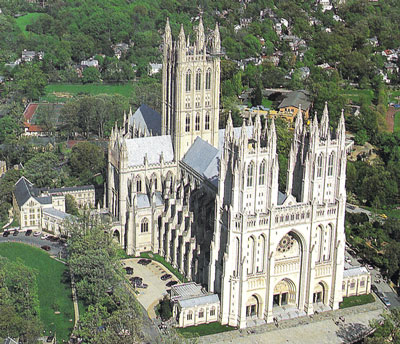Folger Consort Plays Vivaldi
This review is an Ionarts exclusive. Antonio Vivaldi remains one of the composers most beloved of audiences: his name alone was probably enough to fill Washington National Cathedral on Friday night for the Folger Consort's annual New Year Concert. Oddly, the program was selected mostly without reference to the major discoveries in recent years about the Venetian composer's works list. Vivaldi composed music other than a few favorite solo concertos and a few favorite sacred works, but in uncertain financial times, we are likely to see more of this sort of "old favorites" programming. That caution aside, this concert continued a grand tradition in Northwest, and since the Christmas season officially lasts until the Sunday after Epiphany (or, in former times, until Candlemas or Purification, on February 2), it belatedly receives the coveted prize of Best Christmas Concert of the season.
Antonio Vivaldi remains one of the composers most beloved of audiences: his name alone was probably enough to fill Washington National Cathedral on Friday night for the Folger Consort's annual New Year Concert. Oddly, the program was selected mostly without reference to the major discoveries in recent years about the Venetian composer's works list. Vivaldi composed music other than a few favorite solo concertos and a few favorite sacred works, but in uncertain financial times, we are likely to see more of this sort of "old favorites" programming. That caution aside, this concert continued a grand tradition in Northwest, and since the Christmas season officially lasts until the Sunday after Epiphany (or, in former times, until Candlemas or Purification, on February 2), it belatedly receives the coveted prize of Best Christmas Concert of the season.
The focal point of the striking ensemble unity in this concert was the virtuoso violinist Robert Mealy, the concertmaster of the Boston Early Music Festival Orchestra. He led a chamber orchestra of strings, theorbo, harpsichord (or organ), and a few wind instruments and also served with panache as soloist in two concertos, creating a beautifully ornamented performance of an A minor violin concerto, RV 356, especially in the second movement, based on vocal models. Mealy's handling of the "Winter" concerto from The Four Seasons, RV 297, sounded uncannily like the recording by Concerto Italiano, and there are far worse interpretations to emulate. Baroque oboe specialist Geoffrey Burgess also had a fine turn on the C major oboe concerto, RV 447, one of those Vivaldi concerti that did not leave much of an impression on me, other than the lovely middle movement, played here without continuo.
For the choral parts of the famous setting of the Gloria, RV 589, a group calling itself the Washington National Cathedral Consort was well prepared by choir master Michael McCarthy (uncredited in the program but called out for a well-deserved bow). They had a well-balanced sound and a clear understanding of interlocking lines, heard most beautifully in the somber, almost mournful Et in terra pax movement. The only minor complaint was in the occasional disunity of vowel colors, especially the strange o of some singers, modified to a broad ah ("Glaahria").
The focus of RV 589 is two outstanding movements for the contralto soloist -- one would suspect they were written for the unusual voice of Anna Girò, Vivaldi's infamous protegée (or mistress, as detractors often accused), but the work was composed a decade before Vivaldi met her and began to share his home with her. Countertenor Roger Isaacs sang these parts with resonant clarity, filling the movements' pleas for mercy with plangent, pointed sound. He tended to overemphasize consonants, giving too much sibilance on esses and making the initial D almost a T ("Tomine teus"), and years of singing with the Washington Bach Consort made the Germanic tsi creep in to "despiciat" instead of the Italianate chi in the Beatus vir, RV 598.
Soprano Rosa Lamoreaux added extravagant, sparkling embellishments to Ostro picta armata spina, one of the introduzioni to RV 589, a trope-like text set as two arias and intervening recitative for soprano solo. This unwittingly incarnated the line about the flowering of earthly glory, compared to a "a lovely, wandering rose" (floruit pulchra vaga ROSA). Lovely wandering Rosa was also one of the high points in the Gloria, paired with the oboe obbligato of Geoffrey Burgess in the Domine deus rex caelestis movement. As Lamoreaux's second-soprano twin, Ah Young Hong, was not quite the right match -- although a beautiful voice in her own right, her sound was all rounded, smoothed obsidian to the pointy silver of Lamoreaux. A note for the future -- I heard some complaints from people seated at the back that the cathedral's amplification system remains extremely unsatisfactory, capturing the sound too close and then competing with the unamplified echo of the louder lines. For this event, you are better off closer to the performers.
The next concert from the Folger Consort, Mosaic, a program of Jewish, Christian, and Muslim music in Spain (March 13 to 15), at the Folger Shakespeare Library.





















































No comments:
Post a Comment